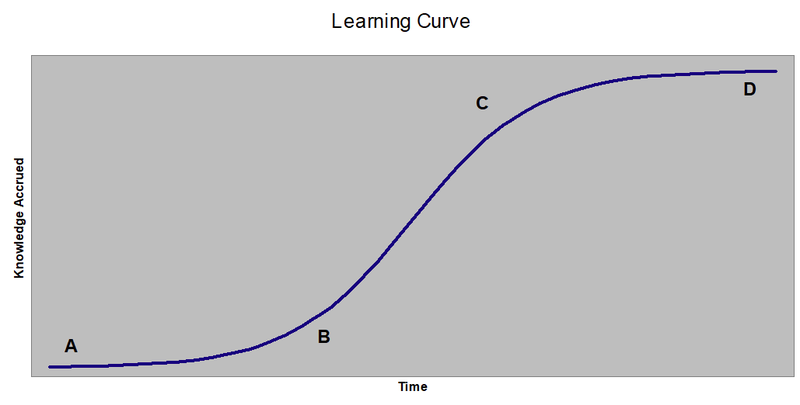The simple answer to this is time. We only have so much time before we graduate a student. We can only touch on so many things and go in depth to even fewer.
For example, I tend to teach certain soft skills throughout the entire program, but I don’t focus much on them. The reason being is that I haven’t seen anyone hired for doing these skills. I hope that I can gently teach soft skills, and that they will sink in over multiple courses. They are good for being successful when you get the job, but they don’t fill a portfolio.
Also, note below the classic learning curve. The basic shape is like figure 1. In a nut shell, it says that you start off knowing little of a subject. You put a lot of time and effort in to gain minimal reward until something occurs, and then learning accelerates. Unfortunately, this cannot last forever. In the end you learn so much that you can only obtain little more about the specific subject. This process might start over each new chapter, on specific subject matter or a large bite of new material.

This is also why most people fear change and learning. The ride from A to B is not fun, and can be very unrewarding. As a teacher, what you want to do is get the student somewhere between B and C, hopefully as close to C as you possibly can. Why? The simple reason is that to get from C to D requires significant time. You can use that precious time to introduce more new material in that time. Essentially, you are wasting time best spent on other things.
For a teacher, the spot C on the graph would be ideal. However, each student is different, and they will fall on different placements along the path. Many poor students may not even make it to B, unfortunately.
I’d like to say as a teacher you know when C (or B) is achieved, but really don’t have a good sense until you give a test or a project, or sometimes not even until after the semester is over. It is a little bit of a finesse move. You could constantly quiz or test, but that method has its own flaws which I won’t go into here, but one issue is that it takes up time to test and quiz.
If someone gets stuck between B and C, that is not the end of the world. You have introduced them to a new subject. They have learned. When they pick the subject back up, chances are they will be able to learn much faster.
Generally, most of my students want to get to D in everything. That makes them feel comfortable in their knowledge. However, it is impractical if you wish to get them out in four years (or whatever degree time frame that is committed.) Colleges try to expose you to a varied amount of material and train you as fast as they can to get you up to speed. I would like to dive in more to these issues, but it’s impossible unless you want to give up something else. In most all cases, it’s not something. It is many things.
NEXT: Question #5. I have a degree in gaming but I still feel that I don’t know as much as I feel I should. How can that be?
If you like to try out one of my free apps (for copying and moving bulk files,) please go here:
https://apps.microsoft.com/store/detail/filesnatch-free/9NTT08T64GLF
If you’d like to pay me $2.79 for roughly the same app without ads, please go here:
https://apps.microsoft.com/store/detail/filesnatch/9P6WGSGHCN67
If you like to see me post silly things from my company, try this:
https://www.facebook.com/people/Digital-Tumult/100057555664875/
If you’d like to see me in action:



The student's question about the depth of learning in education is quite relevant, and it's essential to address this concern. Education should indeed provide a comprehensive understanding of various subjects. To assist in achieving a more profound understanding, I'd like to share a resource https://edubirdie.com/examples/career-goals/ with samples on career goals. Just as the student wishes to learn more deeply, these websites offer valuable academic support, ensuring students have access to the resources they need to delve deeper into their studies. Both articles highlight the importance of expanding one's knowledge and having the right tools to facilitate learning, whether it's in traditional education or through online resources.